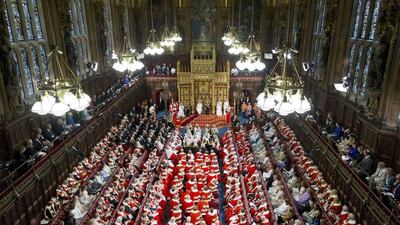On Wednesday, the British monarch delivered an outline of what the UK government has planned for the next session of parliament.
Last year, that programme included an “extremism bill” – a piece of legislation that never quite came to fruition, although a number of policy documents were released that related to the subject.
The matter was raised again on Wednesday and it comes at a time when the issue of tackling extremism in the UK remains high on the agenda. But does it indicate a development in a more constructive direction or not?
Last year, the Queen’s speech addressed a coalition government, and many suspected the Liberal Democrat component was putting the brakes on several unwise pieces of legislation pushed by the Conservatives. There is no such restriction this time. The Liberal Democrats have only a handful of MPs in Parliament this year, and the Labour Party, the main opposition, has been fraught with internal division.
On the topic of extremism itself, there is a large majority in both the Conservatives and Labour who support the state’s tackling of radical extremism.
On the other hand, the “prevent” strategy has come under a great deal of criticism from civil society over the last few years – and there are indications that Labour is reconsidering its stance. Wednesday’s declaration is probably going to strengthen forces in the Labour Party in their belief that the Conservatives still haven’t cracked this nut – because, indeed, they haven’t.
The definition of extremism remains vacuous. There is no common law or statutory definition that makes the term indisputably clear. So when the Queen’s speech declared that the government would “legislate to prevent radicalisation and to tackle extremism”, neither of those words have a legally robust definition.
That would not be a problem – except if there is legislation that pertains to it. The Queen declared a “counter-extremism and safeguarding bill” that would, crucially, create new powers to “disrupt extremists” and to “restrict extremist activity”.
The courts and the police will thus need to know precisely what is and what is not considered to be extremism. The current vague definitions might indeed catch radicals – but they would also catch many conservative Muslims who have nothing to do with terrorism, as well as many conservative Catholics, unconventional hard-leftists, and others across the spectrum.
Donald Trump, throughout his campaign to become the Republican nominee for the presidency of the United States, has said numerous things that could be deemed “extreme”. A number of Conservative MPs were clear in their opposition to those statements, but insisted he be allowed into the UK if he so desired.
Their reasoning was clear – banning bad speech is not always the answer. Rather, giving a better argument is.
There will, of course, be times when extremist speech ought to be considered protected speech, where even when we disagree with the contents of the speech in question, we shouldn’t try to criminalise it. But the UK already has a raft of laws and legislation that define how to deal with speech that isn’t protected, and how to effectively tackle “unprotected speech” – incitement to hatred, violence and so forth. It remains unclear why we need any further laws in this regard – especially when the frames of reference are less, not more, clear as to what they cover.
There is a route through this, but it requires a much wider conversation than is currently being had.
The first point in that conversation needs to be a positive one: the exploration of what British values actually are and that conversation needs to be a wide and consensus-based, taking into account all sectors of British society. It ought to be as independent as possible.
Only then can the negative discussion be fruitfully had, which is what anti-British values mean, or, in other words, “extremism”. And here in particular an engagement with Muslim communities of Britain is vital, not as suspects, but as those who are far more able to understand the differences between conservatism in those communities and radicalism that might lead to violence.
Certainly, there is sometimes a risk in that certain lobby groups, allowing the latter to escape difficult questions in some quarters, sometimes cast Muslim conservatism as Islamism.
It’s subterfuge of a kind, but does not require legal redress in any case, even if civil society at large ought to be more aware of the distinctions.
Muslim religious preachers already have to adhere to certain legal standards that exist in law and that is the important safeguard for all types of extremism.
The question is whether or not the courts and the police are upholding those standards – not if new standards, based on vague and ill-defined definitions, need to be implemented.
The UK government still has a case to answer on that score because on Wednesday, it didn’t. These questions will not go away. If anything, they become more pertinent every passing day.
Dr HA Hellyer is an associate fellow at the Royal United Services Institute in London and a non-resident senior fellow at the Rafik Hariri Center for the Middle East at the Atlantic Council in Washington, DC
On Twitter: @hahellyer


